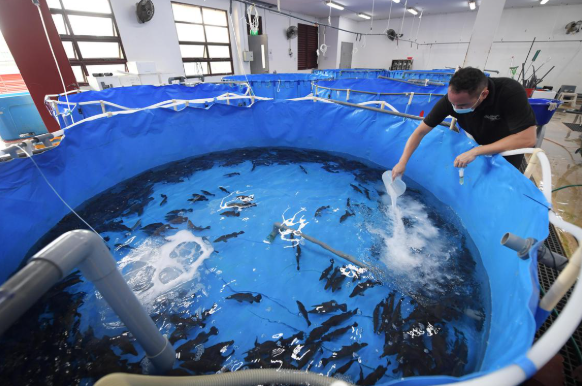AquaPolis Programme aims to advance aquaculture with vaccines, gut microbiome studies, and more.
SINGAPORE – In a bid to enhance the local aquaculture sector, Singapore has launched the AquaPolis Programme, which will focus on innovations in fish breeding, genetics, nutrition, and disease control. The research initiative, aimed at improving the production of key fish species like Asian sea bass (barramundi), red snapper, and marine tilapia, will help local fish farms overcome challenges such as disease outbreaks, parasites, and environmental sustainability.
The programme, which officially kicked off with an agreement signed by the Singapore Food Agency (SFA), National University of Singapore (NUS), Temasek Life Sciences Laboratory, and local farms, seeks to address issues such as scale drop disease, a virus that causes severe losses in Asian sea bass populations. This disease can kill up to 70% of affected fish and remains a significant challenge for fish farms in South-east Asia.
Among the most promising outcomes expected from the programme is the development of an mRNA vaccine to combat scale drop disease. The Singapore Aquaculture Technologies farm, which operates off the eastern coast of Singapore, hopes to use the programme to create this vaccine, offering a potential solution to a disease that has crippled local farms.
In addition to tackling disease and improving the survival rate of fish larvae, the programme will explore how the gut microbiome—the microbes that live in fish intestines—affects overall fish health. The goal is to understand how these microorganisms contribute to disease resistance and immunity, paralleling findings in human health.
By 2026, the AquaPolis Programme aims to make local fish farming more efficient and sustainable, further boosting Singapore’s seafood production. The country aims to increase its local seafood supply, which accounted for 8% of the fish consumed in Singapore in 2022, with 4,400 tonnes of locally farmed seafood.
The programme is part of a broader initiative, the Singapore Aquaculture Plan, designed to raise the productivity of local aquaculture while preserving the marine environment. This is critical as Singapore continues to expand its high-tech farming capabilities, with talent development initiatives also part of the programme’s focus.
By combining cutting-edge research with practical solutions, the AquaPolis Programme aims to strengthen Singapore’s position as a leader in sustainable aquaculture.


